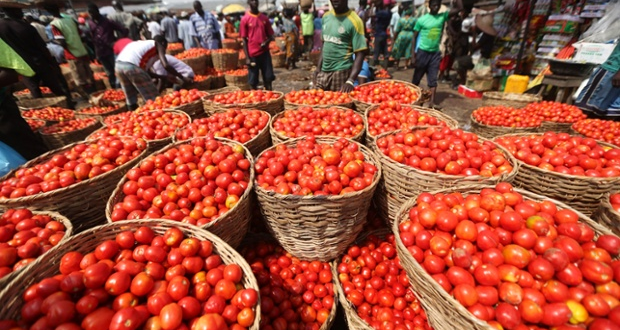The collapse of the Mokwa Bridge in Niger State, triggered by devastating floods, has sent shockwaves through Nigeria’s food supply chain, causing a dramatic surge in the prices of essential food items like tomatoes, peppers, and onions just days before the Eid-el-Kabir celebrations. This critical bridge serves as a vital artery for transporting agricultural produce from the northern regions to the south, and its destruction has left hundreds of trucks laden with perishable goods stranded, disrupting the flow of food and creating widespread anxiety among consumers preparing for the holiday. The timing of the bridge collapse, coinciding with a period of heightened demand due to the upcoming festivities, has exacerbated the price increases, placing an additional burden on households already grappling with economic hardship.
Traders and farmers across the country have expressed grave concerns about the economic fallout of the bridge collapse. Dealers with goods trapped in Mokwa face significant financial losses as their perishable cargo deteriorates. The National Onion Producers Processors and Marketers Association of Nigeria confirmed that numerous trucks carrying onions to the southwest are stuck, while the Kebbi State chapter of the Tomatoes Traders Association reported 15 trucks loaded with tomatoes and peppers marooned, representing millions of Naira in potential losses. These stranded goods are not only impacting individual businesses but also contributing to the scarcity of essential ingredients, further driving up market prices.
The ripple effect of the bridge collapse is being felt across the country, from northern states like Sokoto, Bauchi, Gombe, and Yobe, where farmers and traders report substantial price hikes and potential produce spoilage, to southern states like Lagos, Edo, Bayelsa, Delta, Osun, Cross River, and Akwa Ibom, where consumers are facing escalating costs for basic food items. Market surveys conducted in various cities reveal a significant jump in prices, with the cost of tomatoes, peppers, and onions increasing by as much as double in some areas. Consumers express their frustration and concern over the rising cost of living, with many struggling to afford even basic meals. The disruption underscores the fragility of the food supply chain and the vulnerability of consumers to unforeseen events.
The impact on households preparing for Eid-el-Kabir is particularly acute. The holiday traditionally involves extensive cooking and feasting, making tomatoes, peppers, and onions essential ingredients. The sudden price surge has forced many families to adjust their budgets and scale back their celebrations. Housewives and food vendors alike lament the increased costs, expressing concern about the added financial strain during a time meant for joyous celebration. The situation highlights the intersection of economic hardship and cultural traditions, demonstrating how external factors can disrupt even the most deeply ingrained practices.
Market stakeholders are appealing to the government for urgent intervention to address the crisis. Calls for the swift repair of the Mokwa Bridge are widespread, as this is seen as crucial for restoring the flow of goods and stabilizing prices. Traders’ associations and truck owners are urging the government to act quickly to mitigate the economic losses and prevent further disruptions to the supply chain. In addition to infrastructure repairs, some are requesting financial assistance to compensate for lost goods and support affected businesses. The situation underscores the need for proactive measures to strengthen the resilience of the food supply chain and protect vulnerable communities from such disruptions.
The Mokwa Bridge collapse has exposed the interconnectedness of Nigeria’s food system and the vulnerability of its supply chain to natural disasters. The resulting price hikes and shortages underscore the importance of investing in robust infrastructure and developing contingency plans to ensure food security, particularly in times of crisis. The incident also highlights the economic impact of such events, impacting not only businesses and traders but also households and consumers across the country. The widespread concern and calls for government intervention reflect the urgent need for solutions to address both the immediate crisis and the long-term challenges facing Nigeria’s food supply chain.


